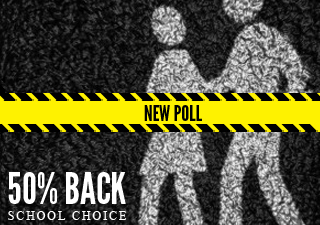Media
Taxpayer-Funded Lobbyists’ Survey Contradicts Real Polls
 The Pennsylvania School Boards Association has released a new “survey” claiming that state residents oppose plans to provide vouchers to students. The PSBA’s funding comes from taxpayers through school districts, and in turn it bankrolls lobbying efforts like Pennsylvanians Opposed to Vouchers.
The Pennsylvania School Boards Association has released a new “survey” claiming that state residents oppose plans to provide vouchers to students. The PSBA’s funding comes from taxpayers through school districts, and in turn it bankrolls lobbying efforts like Pennsylvanians Opposed to Vouchers.
John Micek blogs:
Speaking of which, two-thirds of state voters were opposed to vouchers in a poll conducted on behalf of the Pennsylvania School Boards Association by F&M pollster G. Terry Madonna.
But there are several misnomers in that brief sentence. It was a “survey” rather than a poll. The survey was not of “voters”—as most polls typically are—but of “adults” (and without reference to how “adults” were identified). And while Terry Madonna’s day job is with Franklin and Marshall College, this survey was done by his own consulting company, not through F&M.
More importantly, the PSBA-commissioned survey contradicts polls done by professional pollsters:
- April 2011 Muhlenberg/Morning Call poll: 54 percent of Pennsylvania voters support vouchers for low income families (30 percent oppose).
- November 2010 Pulse Opinion Research: 50 percent of Pennsylvania voters support vouchers (30 percent oppose); 46 percent support scholarship tax credits (30% oppose)
- April-May 2011 Education Next (national): Depending on wording of question, support for vouchers is 47 percent support to 27 percent opposed (voucher-friendly wording) or 39 percent support to 38 percent opposed (voucher-unfriendly wording).
Indeed, Pew Charitable Trusts looked at the demands of Philadelphia parents who said they were not satisfied with the quality of schools in the area, and they want more choice for their children.
Why? Could it be the vast numbers of students who can’t read or do math at grade level? Or perhaps parents are frustrated with the thousands of acts of violence against students or staff in failing schools.
Despite the denial of taxpayer-funded special-interest groups, parents, students and voters want more educational choices. Lawmakers need to act now.